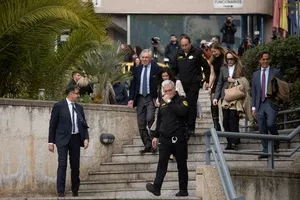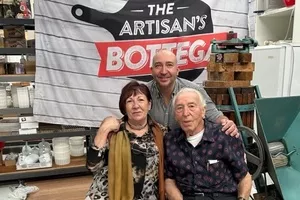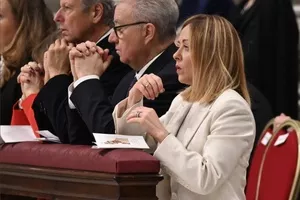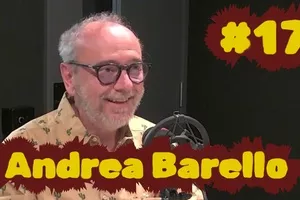A few days before the dinner, I went to visit Giovanni and his wife Anna at their beautiful house that overlooks the park in Coburg.
When I arrived, Giovanni told me straight away that he had an illness which limited his movements, caused him to have poor memory and prevented him from expressing himself clearly.
Then for about an hour, he did nothing but talk, recounting his Australian adventures that began in 1952, when he migrated to a country he knew nothing about.
“I had never thought of emigrating anywhere, but one September afternoon, while I was working in an olive oil mill, I heard a whistle, which was the family call,” he recalled.
“I turned around to see my brother prompting me to come home, because at 5:00 pm that day I was to leave for Australia.”
In the Calabrian town of Seminara, a very young Giovanni returned to his house to find his mother and sister who had been crying and had already packed a suitcase with all of his belongings.
His father had already made the immigration request without him knowing by forging his signature.
“I protested that I didn’t want to leave, that my family had forced me,” Giovanni said.
“To make sure I didn’t change my mind, one of my cousins came with me to Naples, where I stayed for two weeks in an immigration camp in Bagnoli, because the boats that were to take us to Australia were damaged.”
After 44 days of travel, Giovanni and many other young people like him, frightened and confused but willing to work, were transferred from Melbourne to the migrant reception camp in Bonegilla.
“They were three horrible months, until we organised the Bonegilla revolt,” he said proudly.
The experience of the revolt (in which the army intervened) was symbolic for a young Sgro, who once released from the camp, found work first as a painter in Cobram, then in Melbourne in 1954.
While working in Melbourne, he developed an interest in social forces, becoming very active in the union.
It was a small step from the union to politics, and soon Giovanni Sgro, who had had no interest in politics back in Calabria, was enrolled in the Communist Party of Australia (CPA, which no longer exists), and then in the Labor Party.
“The migrant workers were discriminated against, and by the social organisations too,” Sgro recounted.
“They thought of us as numbers, as pawns who were only good for the registration fee and the possible vote.
“But I wanted to change these things; I wanted to represent and make heard the voice of the Italians and Greeks.”
Sgro had experienced discrimination himself.
He was refused Australian citizenship for years because of his political beliefs (the secret services had a dossier on Sgro for his connection to the CPA).
“I wanted to return to Italy to visit my mother who was sick, to bring her some comfort,” he said.
“But the authorities not only denied my citizenship, they also refused my re-entry visa.
“I had to wait until Gough Whitlam’s Labor government was elected, when the then immigration minister, Al Grassby, handed me my certificate of naturalisation at a ceremony at the Coburg Town Hall with more than 400 other people.”
In the early ’70s, Sgro founded the Italian Federation of Immigrant Workers and their Families (FILEF), when he was the longa manus of the Italian Communist Party (PCI), and was the first president of the Ethnic Communities Council of Victoria.
With FILEF, Sgro organised the first congress at the Trades Hall Council, inviting political and trade unionist speakers.
“At that time the secretary was John Halfpenny,” Sgro said.
“I clashed with him because he didn’t want to employ interpreters to translate for the migrant workers.”
FILEF became a strong influence in the community and was often a pilgrimage destination for Italian PCI politicians, such as Giancarlo Pajetta in the ’80s.
Before entering Spring Street as a member of the Upper House, Giovanni recalls with pride, even now, the dubious privilege of being one of the few to have been locked up in the cell underneath Parliament House for disturbing a session, along with the principal of Brunswick Girls’ High School, June Engish.
Times were changing when Giovanni took his first steps into Parliament in 1979.
There was still no talk of multiculturalism, but Sgro knew that Australian society was heading in that direction and decided to force its hand.
“I made my first speech in Parliament in Italian and, naturally, it was not recorded in the minutes, but the news caused much outcry and turned the public’s attention towards the fact that migrants could also access Parliament.”
With the election of the Cain government, the ’80s was a golden era for the Italian community and for relations with Italy, with the presence of important festivals and big events such as the State-Regions Conference.
Giovanni was always there, to represent the government or stand alongside the then premier or minister for ethnic affairs.
I interviewed Sgro for years when I worked in radio, waking him up early in the morning to record him and edit the recording in time for the program, which started at 8:00 am.
Despite the frequent early starts, I always encountered an extremely willing representative, and while many years passed and many things changed, Giovanni’s friendliness was a constant, even during our last chat.
Those who knew Giovanni will tell you he was a man who devoted his entire life to creating a better society for everybody, and a more equal one for migrant communities.
It is also worth mentioning the stir he caused by bringing busloads of pensioners to the Italian Consulate on Elm Street, South Yarra, to protest about the opening hours and the few chairs available in the waiting rooms, which forced the elderly to sit on the stairs.
In his parliamentary career, which ended in 1992, Giovanni was president of parliamentary commissions and vice-president of the Upper House.
“I could have been president, but not only did the Conservatives not vote for me, some members of my own party ostracised me because I was still a ‘wog’, a ‘dago’,” he said.
His election to Parliament was a great source of pride for Giovanni, because it proved that anyone who arrived in Australia with little education or without speaking a word of English could make it if they were committed and dedicated.
A man small in stature, but with a large presence and a voice that did not need a microphone, Giovanni was always flanked by Anna, who he met in 1964 at a political event at the Unitarian Church (a Catholic church that was founded for Australian communists), the same church where his funeral will be held tomorrow [Friday, March 22].
In his last interview with me, Giovanni said he had courted Anna in Carlton, at venues that no longer exist, such as Genevieve’s (the owner was from Abruzzo and was at Bonegilla with Giovanni), which was next to the old Carlton Movie House (but everyone called it the “Carlton Bughouse”).
When asked if he was satisfied with his life, Giovanni concluded:
“I am proud of my political achievements. On a personal level, I have a splendid wife and three children, but they grew up without a father, because I was always at meetings and visiting my constituents. Only now can I finally redeem myself with my eight grandchildren.”




























